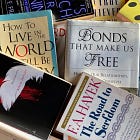About Time, Session 9: Your Team Needs You
Our team needs us. We are loved. What better reasons can we have to make the most of our four thousand weeks?
Starting May 3rd, we will begin studying two short books on Constructive Living: one by David K. Reynolds and another by Gregg Krech. Their action-oriented approach to life offers many practical applications. For more details, please refer to the announcement posted earlier this week.
I’m removing the paywall for this final session of About Time. If you become a paid subscriber, you will get immediate access to all previous Mindset Shifts U sessions, plus our upcoming Reynolds/Krech sessions. Later in 2025, we will consider essential works by Ralph Waldo Emerson, F. A. Hayek, Adam Smith, among others.
In a short YouTube video, Gregg Krech reminds us, “When it comes to attention, I am the enemy.” Krech means we are the ones, not others, who are misdirecting our attention. Looking up at the stars for the umpteenth time, Krech realized he was not the “center of the universe.” He shared this story:
The other day I was driving home behind a red Plymouth driven by an older woman with gray hair. Just when we reached the fork in the road before the general store, she went to the left, and I took the road to the right. It suddenly dawned on me that this woman had an entire life that would continue at the same time as mine. She had problems, she had aches and pains, she laughed at jokes I had never heard before. How is this possible? Even more outrageous was the fact that there were more than 5 billion people who also had lives of their own.
Krech is playfully teasing us about our mutual egotism. He realized, “My life was only a speck in a rather large crowd. There were also animals and insects and trees and flowers and buildings. This is what we might call a realistic perspective.”
Krech pointed out, as we study attention, “one of the first things we discover is how often our attention is focused on ourselves.”
In our study of Bonds That Make Us Free we explored the Martin Buber/Terry Warner contrast: seeing others as people with their own needs and dreams versus seeing them as its—merely instruments to fulfill our own.
Krech referred to research findings showing a “direct relationship between self-focused attention and psychological problems. The weight of available data clearly suggests an association between disorder and self-focused attention regardless of the particular disorder.”
Krech tells us, “The universe wants us to dance, but we're too self-absorbed to hear the invitation. Every once in a while, the beauty of the world is so stunning, so captivating, that we can no longer ignore it, and we forget ourselves and dissolve into something greater.”
If you think here, Krech sounds like Margaret Prescott Montague, whose essay we considered in our Mindset Shifts U session on New Year’s Day, and so do I.
Krech observed what many have discovered yet don’t consistently live: “By giving up on ourselves our surrender becomes our salvation. Our disappearance provides relief even for a few moments, but once you've tasted those moments you've discovered something about attention.” Krech added,
It's the tragedy of psychology that it is still preoccupied with self-preoccupation. To often it teaches us to do what we already do too well—pay attention to ourselves. In the course of exploring our pain, our worries, our feelings, and our dreams, we forego the development of a more needed skill to notice and engage the world around us.
The late great French philosopher Simone Weil would agree. She wrote in a letter, “Attention is the rarest and purest form of generosity.”
Naturally, Weil is discussing moments when we focus on something beyond our ego's interpretation of our experience. How often do we really make it about others? What are the needs of our partner, our children, and our colleagues? Do we make it about others by sincerely asking the supermarket clerk about her day, or do we mentally complain about the lines? How often do we really notice the beauty that Krech and Montague pointed to?
Burkeman, Krech, and Weil guide us to consider what we pay attention to. We cannot turn off our power of awareness, but we can pretend we are mindless by misdirecting our attention.
We find so many ways to remain mindless about our power of attention. Burkeman writes, “Procrastination, distraction, commitment-phobia, clearing the decks, and taking on too many projects at once are all ways of trying to maintain the illusion that you’re in charge of things.”
Often, what we need to do next comes with emotional discomfort. Do it anyway.
We look for the right time to begin. We look for constant validation. Burkeman writes,
There’s no point in waiting to live until you’ve achieved validation from someone or something else. Peace of mind, and an exhilarating sense of freedom, comes not from achieving the validation but from yielding to the reality that it wouldn’t bring security if you got it.
We think everyone is competent, and we are winging it. Believing this falsehood, we allow ourselves to descend into a nihilistic funk. Burkeman observes, “But I sometimes think of my journey through adulthood to date as one of incrementally discovering the truth that there is no institution, no walk of life, in which everyone isn’t just winging it, all the time.”
As we study Reynolds and Krech, they will help us to identify other false beliefs that get in our way.
In his book Doing Nothing, Steven Harrison shares this parable:
A seeker, after a long and difficult journey and many hardships, reaches the mountaintop where resides the guru and solitude. “What, master, is the meaning of life,” the supplicant asks.
“Life, my son, is a bowl of cherries,” replies the guru.
The seeker is outraged after all he's been through to reach the guru and lets the guru know what he thinks of his answer.
The guru considers for a moment, and says, “You mean it's not?”
Burkeman wants us to embrace our life with all its messiness. He writes, “It was always already the case that you would never experience a life of perfect accomplishment or security. And your four thousand weeks have always been running out.” Given that reality,
You get to give up on something that was always impossible—the quest to become the optimized, infinitely capable, emotionally invincible, fully independent person you’re officially supposed to be. Then you get to roll up your sleeves and start work on what’s gloriously possible instead.
Burkeman shares this story about Carl Jung:
Carl Jung wrote a reply to a correspondent, Frau V., responding to several questions on the proper conduct of life, and his answer is a good one with which to end this book. “Dear Frau V.,” Jung began, “Your questions are unanswerable, because you want to know how to live. One lives as one can. There is no single, definite way…
The individual path “is the way you make for yourself, which is never prescribed, which you do not know in advance, and which simply comes into being itself when you put one foot in front of the other.” His sole advice for walking such a path was to “quietly do the next and most necessary thing. So long as you think you don’t yet know what that is, you still have too much money to spend in useless speculation. But if you do with conviction the next and most necessary thing, you are always doing something meaningful and intended by fate.”
Do “the next and most necessary thing” with your full attention and heart.
In his book Tunneling for Sunlight, Gregg Krech shares related advice:
We all know what it’s like to be knocked to the ground. We get sick. We get injured. We have financial problems. Our kids get into trouble at school. We lose our jobs. Loved ones die. It wears you out when you keep getting knocked down. You get frustrated. You get angry. You get tired. And after a while you get so worn out that you don’t really feel like getting back up.
You don’t feel like playing any more. But you get back up for two reasons: First, your team needs you. Your team may include your kids or your aging parents, your partner, your dog or colleagues at work. Someone is counting on you to stay in the game and play.
The second reason you get up is that you’re loved. You don’t always notice it because it’s easy to become preoccupied with how much you hurt. But you are loved . . . by the farmers who grew the food you ate, the mechanic who changed your oil, and the people who maintain the roads. You are loved by the people who watch over your kids at school and their teachers. You’re loved by doctors, pharmacists, plumbers, truck drivers, bakers and mailmen. Even though they don’t always meet your expectations, they are doing what they can to try to keep you in the game. Without them the game would be unplayable.
So you’re needed and you’re loved. And when you get back up—even though you feel worn down and exhausted – you have a great opportunity. You have the chance to show someone else that you need them and love them. And then you can help them up and give them a reason for staying in the game. That’s how you win. (emphasis added)
Our team needs us. We are loved. What better reasons can we have to make the most of our four thousand weeks?
Like Krech and Burkeman, we may forget, but we will keep studying, learning, and practicing because our team needs us.
Thank you for supporting this work and for considering these ideas with me.






Wow, Barry - this one is pure gold.
"The second reason you get up is that you’re loved. You don’t always notice it because it’s easy to become preoccupied with how much you hurt. But you are loved . . . by the farmers who grew the food you ate, the mechanic who changed your oil, and the people who maintain the roads. You are loved by the people who watch over your kids at school and their teachers. You’re loved by doctors, pharmacists, plumbers, truck drivers, bakers and mailmen. Even though they don’t always meet your expectations, they are doing what they can to try to keep you in the game. Without them the game would be unplayable."
I for one have never before viewed my simple everyday interactions with other people as received love. What a powerful observation! People doing their best at what they do in service to others certainly IS love, isn't it?
And again I say... wow.
Thanks Barry. As always, an illuminating post. While reading this I couldn't help but think about how I needed to read this many decades ago, although I have no regrets.
Also, whenever I overcome procrastination and just start to do the next necessary thing, good things happen. "Well begun is half done"—Mary Poppins